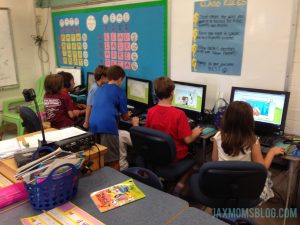Jacksonville moms – I have blogged here about gifted children in the past, and a common question that I get is “what do I ask the teacher for?” It is hard to know what kinds of differentiation work in the classroom for advanced or gifted children.
Get Your Child Tested
 Before asking for differentiation, it helps to have some testing completed. This can be in the form of IQ tests, in level achievement tests, and out of level testing. I prefer that clients that I work with, if all possible, have all 3 before we officially go to the school for accommodations. But, if you are advocating on your own, you might not need all three.
Before asking for differentiation, it helps to have some testing completed. This can be in the form of IQ tests, in level achievement tests, and out of level testing. I prefer that clients that I work with, if all possible, have all 3 before we officially go to the school for accommodations. But, if you are advocating on your own, you might not need all three.
IQ testing can be done with your school district for free in many cases, or with a private tester. In level achievement testing refers to your FCAT, ITBS or other standardized test. Out of level achievement refers to tests that are a couple of grades (or more) above your student’s current grade. There are several ways to obtain those. Click here for an article from the Davidson database about out of level or above level testing.
Curriculum Compacting
Once you have some testing and have gotten to know your teachers, you might decide that your child’s needs are not being met and you want to call a meeting and offer some suggestions. A good start is curriculum compacting, or pre-testing. For example, let’s say your second grader is very far ahead in vocabulary and finds the vocabulary lists and quizzes tedious. You could ask the teacher to pre-test your child for each unit, to see if she already knows the words. If she gets at least a 90%, let’s say, then she does not have to study that unit with the class, but can do a third grade list, instead.
Online Courses
Using online courses is another option, while in the classroom. A classic example of this is Aleks math. This is a computerized program with built in lessons and assessments. If you have a child, let’s say a 3rd grader, who really needs 5th grade math, the teacher could allow him to do Aleks on the computer in the back of the room during math time. Many children learn quite well independently in their area of strength.
Subject Acceleration
Subject acceleration works for some students. Using this method depends on the school’s schedule. A school near me has a reading instructional hour, wherein all kids read or have instruction in reading at the same hour, school wide. This kind of schedule makes subject acceleration easy. A first grade student who needs reading instruction at a second grade level could just be subject accelerated into that 2nd grade reading room for that hour, but then rejoin her classmates for the rest of the day. This takes the burden of classroom differentiation off of the classroom teacher.
Independent Projects
Another idea is independent projects. If a 4th grade boy who loves and is particularly talented in science needs differentiation, he could be allowed to do an independent project. This should NOT be assigned as extra work. He could do an experiment (perhaps well above the parameters of his grade level) and write his results and report back to the teacher. He could be allowed to do this during part of class time. It is important that he be mentored through this process so that he doesn’t become frustrated.
A great resource for parents is the book Differentiated Projects for Gifted Students: 150 Ready-to-Use Independent Studies.
Small Groups
Lastly, there are small pull out groups. If a classroom has a handful of students who need to work at a more advanced level, these kids can be grouped together and taken to another classroom for a part of the day and taught according to their level. This is also a fun way to do projects like science projects, debates, and more in depth literature, math, or social studies.
Hopefully, this gives you all some ideas for what is possible in the classroom, in terms of differentiation. Whole grade skipping is another possibility, but I’ll save that for another blog.
Here is a book suggestion about classroom differentiation: Teaching Gifted Kids in the Regular Classroom by Susan Winebrenner.
















